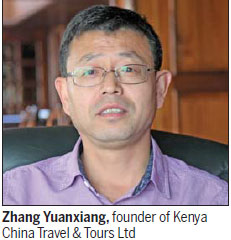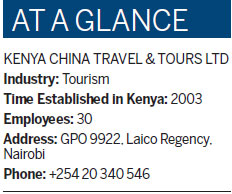As bilateral ties improve, founder of tour agency believes a cultural exchange platform is vital
When Zhang Yuanxiang made his first trip to Kenya, in 1999 to work as an interpreter for a trading company, hotel receptionists asked him if he was from Japan, South Korea, Taiwan or from Hong Kong. He quickly realized that cultural exchanges and communication between Chinese mainland and the East African country were "empty".
|
Tour groups observe animal migration in the Maasai Mara National Reserve in Kenya, which takes place from July to October. Provided to China Daily |
"No one even knew where Beijing was," he says.
Conversely, Maasai Mara - the massive game reserve in Kenya's Narok county named after the Masai people - was a difficult, strange name to pronounce for Chinese tourists traveling with him.
At the time, there was little information about Kenya in China, let alone direct flights to the country.
But his experiences during that trip, in which he traveled through the African Savanna, sparked a newfound fondness for the wilderness and for nature in Zhang. He says he remembered feeling that this region of wonders must be seen and experienced by more Chinese people, which eventually led to his creation of Kenya China Travel & Tours Ltd in 2003. KCTT is currently a leading tour company for Chinese tourists to Kenya.

Zhang believes it is essential that tour companies serving Chinese tourists going to Kenya or elsewhere in the Africa not only provide a place for travelers to eat, sleep and sightseeing, but create a cultural exchange platform to experience a region's uniqueness and spirit.
He says a well-rounded tour company is increasingly important as China and Kenya develop their bilateral ties because each nation doesn't fully understand each other culturally.
"Traveling to a new destination like Kenya will give Chinese tourists a chance to explore a new culture, which will be different from their initial impressions of the country. Also, Kenyans can see what Chinese culture is like," says Zhang, who adds that all people involved in this exchange chain are ambassadors for their culture.
KCTT served more than 8,000 Chinese customers last year. Though Zhang is expecting better numbers this year, the Ebola epidemic has hampered tourism to Kenya. Still, he is thankful that his company is moderately successful.
"Despite huge potential, my tourism business couldn't have happened without the help from the Chinese embassy (in Kenya) because it encouraged me to introduce more Chinese tourists to the country," he says. "The business environment and security situation at the time were not that helpful to the tourism industry, so I initially hesitated a lot to start my business."
Tourism in Kenya is an economic pillar in the country, contributing more than 12 percent to the country's annual GDP. China currently supplies 3 percent of the total number of foreign visitors to Kenya.
Between 2003 and 2004, tourism was mainly tuned into and driven by business and official delegations, which packaged Kenya as a complementary destination to Egypt and South Africa.
"It was hard at the beginning," Zhang says in describing the evolution of his company. "I had to talk to all of the hotels and car rental companies by myself to have a clear concept of the Kenyan market. Simply put, all of the old companies had been established for Western tourists, and their experiences were not relevant to us."

After his business began improving, China and Kenya signed an agreement to make Kenya an approved tourist destination, which created more growth potential for Zhang's company. The agreement allowed Chinese tourists to visit Kenya in tour groups organized by commercial companies.
KCTT was earmarked as one of 50 companies in Kenya qualified to receive tourist groups from China, and it was the only one focusing on the Chinese market. The signing of the deal became a turning point for KCTT, says Yan Xueai, a partner at the company.
After 2005, tourism in Kenya became less tailored to traditional official and business delegations. Still, KCTT handled a relatively low volume of tourists, with the average annual number between 2005 and 2008 at about 2,000.
"Kenya was not a singular destination. People usually like to go to Egypt, South Africa and Kenya as a package because they are more likely to take Africa as one concept and one place," he says. "So at the time, routes were so simple that people were only interested in going to Maasai Mara and Nakurum, where you could see crowds of flamingos."
To boost Kenya as a tourist destination among Chinese tourists, KCTT tried a number of marketing strategies.
"We invited major tourist agencies in China to visit Kenya, especially to new destinations unfamiliar to Chinese people. When they had real personal experiences in Kenya they would recommend them to their clients," Zhang says. "Also, a well-known Chinese businessman and photographer named Luo Hong made a special contribution to this process by exhibiting his photos of the country in many major public spaces, including Beijing's subway system."

In 2007, Zhang published a book about Kenya called Fall In Love With Kenya. He worked closely with the Kenyan tourism authority and several Chinese tourist agencies on the book.
In 2010, he says the company had its breakthrough, serving more than 5,000 customers that year. Since then, the company has exceeded that mark each year.
As a leading tourist company in Africa targeting the Chinese market, the company doesn't slash prices to compete against other companies.
"We don't want to compromise our services by reducing prices because our services exhibit the cultural spirit of Kenya, which is more valuable to customers," Zhang says.
He says his company is looking to infuse more of the country's history and culture into their new services because Chinese customers are fond of a country's cultural history and natural wonders.
The company is also focusing on using more local tour guides. He says previous tourist groups from China have requested Chinese guides because they thought Chinese guides would be more suitable to their needs. KCTT sees things differently.
"We need to foster more local tour leaders to further localize our operation," says Wang Yun, the first certified tour guide from China in Kenya and the most popular one at KCTT.
She says what is highly valued by guests is a tour guide's professionalism, rather than his or her skin color. Local guides who are able to speak the Chinese language or who are familiar with the Chinese culture can offer better and more unique services.
"We want to collaborate with Kenyan authorities and universities to foster more professional tour leaders for our company in the near future," she says.
lilianxing@chinadaily.com.cn
(China Daily Africa Weekly 10/17/2014 page19)
